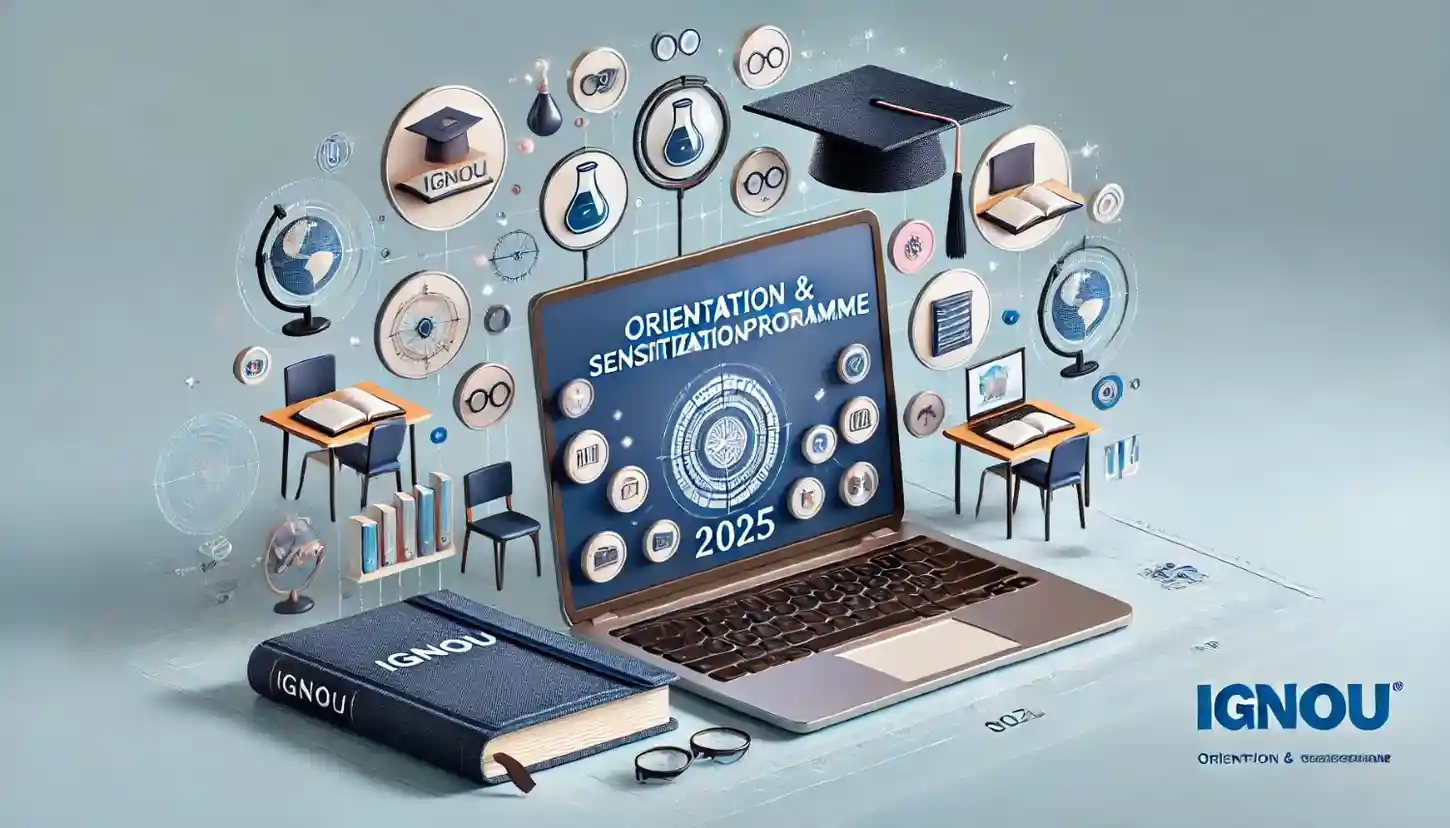The NEP Orientation & Sensitization Programme 2025 organized by Indira Gandhi National Open University (IGNOU) under its Malaviya Mission Teacher Training Centre (UGC-MMTC) is an essential initiative for enhancing the skills and knowledge of faculty members across India. As the National Education Policy 2020 (NEP) reshapes the landscape of education, this programme serves as an opportunity for educators to understand and integrate the policy into their teaching practices. Let’s explore this remarkable programme in detail.
Introduction
1. Overview of the NEP Orientation & Sensitization Programme
The NEP Orientation & Sensitization Programme is designed to provide faculty members with an in-depth understanding of the National Education Policy (NEP) and its implications for higher education. The programme will be conducted by the Malaviya Mission Teacher Training Centre (UGC-MMTC), a key initiative of IGNOU that focuses on faculty development and skill enhancement.
This programme will run for eight days, from 10th February 2025 to 19th February 2025, with sessions scheduled daily from 11:00 AM to 2:15 PM. As one of the most anticipated academic events, this initiative aims to educate and equip faculty members with the necessary skills to adapt to the changes brought about by the NEP, which aims to revolutionize the education system in India.
2. Importance of Faculty Development Programmes
Faculty development programmes play a crucial role in improving the quality of education. They ensure that educators are well-prepared to handle evolving teaching methodologies, new curriculum frameworks, and innovative technologies. In light of the NEP, these programmes are even more significant as they help faculty members align their teaching methods with national educational goals. The UGC-MMTC’s initiative is a step forward in ensuring that India’s educators are equipped to meet these demands.
Understanding NEP (National Education Policy) 2020
1. What is the National Education Policy?
The National Education Policy (NEP) 2020 is a groundbreaking policy introduced by the Government of India to overhaul the education system across the country. NEP’s key focus areas include universal access to education, multi-disciplinary learning, and equity in education, all designed to foster holistic development in students.
NEP aims to make education more flexible, inclusive, and interdisciplinary. It envisions an educational environment that focuses not just on knowledge acquisition but also on critical thinking, problem-solving, and overall student well-being. For educators, understanding NEP is essential as it lays the foundation for a new era of educational excellence.
2. NEP’s Focus on Teacher Development
One of the core pillars of NEP 2020 is the development of educators. The policy acknowledges that teachers are the bedrock of the education system and emphasizes the need for continuous professional development. It highlights the importance of pedagogical training, leadership skills, and upskilling to ensure that teachers are prepared to meet the challenges of a rapidly changing educational landscape. This is where programmes like the NEP Orientation & Sensitization Programme play a crucial role.
Programme Details
1. Date and Duration of the NEP Orientation & Sensitization Programme
The NEP Orientation & Sensitization Programme will take place from 10th February to 19th February 2025, with sessions running daily from 11:00 AM to 2:15 PM. This eight-day online programme will provide faculty members with a structured approach to understanding and applying the principles of NEP in their teaching practices.
2. Format of the Programme
The programme will be held online, making it accessible to educators across the country. The online format allows faculty members to attend the sessions without the need for travel, ensuring wider participation. The daily sessions will be interactive, including discussions, case studies, and practical tips for implementing NEP reforms in classrooms.
The interactive nature of the programme ensures that participants can actively engage with experts, clarify doubts, and learn from real-world examples of NEP implementation.
Target Audience
1. Who Can Apply?
The programme is designed for faculty members from a wide range of institutions, including:
- State and Central Universities
- Deemed Universities
- Affiliated Colleges
- Private Colleges
- Research Institutions
The programme is open to a variety of educators, from professors to associate professors and research scholars. The target audience also includes faculty members at the Ph.D. and Post-Doctoral levels, making it a comprehensive programme for all educators involved in higher education.
2. Why the Programme is Crucial for Teachers
As NEP 2020 is implemented across the country, it’s vital for educators to stay updated on the latest educational trends and practices. This programme helps teachers understand how to apply the NEP guidelines to their teaching methods and curriculum. It empowers educators to foster critical thinking, holistic development, and multi-disciplinary approaches in their students, aligning with the core objectives of NEP.
Programme Objectives
1. Sensitization to NEP 2020
One of the primary goals of this programme is to sensitize educators to the various aspects of NEP 2020. Participants will gain a comprehensive understanding of the policy’s framework, including the new pedagogical models, curriculum reforms, and student-centered approaches that NEP advocates.
The programme will break down NEP’s components into manageable sessions, ensuring that educators can absorb and apply the information to their teaching strategies effectively.
2. Development of Teaching Skills
The programme is designed not just to inform but to equip educators with practical skills. Sessions will focus on improving teaching techniques, incorporating modern technologies into classrooms, and adopting a student-centered approach that is core to NEP 2020. By the end of the programme, educators will be better prepared to engage their students in innovative, meaningful, and interactive ways.
How to Register for the Programme
1. Step-by-Step Registration Process
Registration for the programme is straightforward and can be completed in a few simple steps:
- Step 1: Visit the official registration portal at https://mmc.ugc.ac.in/registration.
- Step 2: Fill in the necessary details such as name, institution, and contact information.
- Step 3: Log in with the credentials provided by the programme organizers.
- Step 4: Select the NEP Orientation & Sensitization Programme and complete the registration.
After completing these steps, participants will receive a confirmation email and additional details about the programme schedule.
2. Registration Deadline and Payment (if applicable)
The registration portal is open until the deadline of 25th February 2025. It’s essential to complete your registration and payment before this date to ensure your participation. The registration fee (if applicable) can be paid online during the registration process, with various payment options available.
Key Themes of the Programme
1. Higher Education and Society
One of the main themes of the programme is understanding the role of higher education in shaping society. NEP 2020 emphasizes the importance of education in promoting social justice, inclusive growth, and national development. Educators will learn how to align their teaching practices with these goals and contribute to societal well-being.
2. Holistic and Multidisciplinary Education
NEP 2020 advocates for holistic education, where students are encouraged to develop knowledge in multiple fields. The programme will train educators on how to foster multidisciplinary learning, encourage interdisciplinary dialogue, and develop a more well-rounded curriculum that goes beyond traditional boundaries.
3. Research and Development
The NEP also stresses the importance of research and innovation in higher education. Faculty members will learn how to incorporate research into their teaching methodologies, create a research-friendly environment, and encourage students to think critically and explore new ideas.
4. Academic Leadership and Governance
Finally, the programme will delve into the role of academic leadership in shaping the future of higher education. Participants will learn how to develop leadership skills, manage educational reforms effectively, and foster an inclusive and dynamic academic culture.
Programme Coordinators
1. Key Organizers and Experts Leading the Programme
The programme will be led by esteemed experts in the field of education, including:
- Prof. Uma Kanjali, the Hon’ble Vice Chancellor of IGNOU, who will provide a broad vision of the programme’s objectives.
- Prof. Anita Priyadarshini, Director at STRIDE, IGNOU, who brings expertise in distance education and faculty development.
- Prof. Amiteshwar Ratra and Dr. Hemlata Baghel, who are experienced coordinators with vast knowledge in educational reform.
Their expertise will ensure that the sessions are relevant, engaging, and impactful for all participants.
Expected Outcomes of the Programme
1. Skill Enhancement for Teachers
After completing the programme, teachers will have gained practical skills in curriculum development, student engagement, and teaching methodology, all aligned with NEP 2020. Educators will be equipped to adopt new pedagogies, integrate technology, and create an inclusive learning environment.
2. Better Understanding of NEP Implementation
Teachers will also leave with a comprehensive understanding of how to implement NEP in their classrooms, ensuring that the educational reforms are effectively translated into practice at the grassroots level.
Certification and Recognition
1. Certificate of Completion
After successfully completing the NEP Orientation & Sensitization Programme, participants will receive a Certificate of Completion. This certificate serves as a formal acknowledgment of the educator’s participation and understanding of the National Education Policy 2020.
The certification is more than just a document; it reflects the commitment of educators towards continuous professional development and their role in shaping the future of India’s education system. For participants, this certificate can enhance their professional profile and demonstrate their readiness to implement NEP reforms effectively.
2. How the Certificate Adds Value to Teachers’ Career
The Certificate of Completion holds significant value in the academic community. It can act as a credential that highlights the teacher’s commitment to staying updated on the latest educational reforms and pedagogical trends.
Faculty members can use this certification to showcase their qualifications for career advancement, promotions, or job opportunities within universities, research institutions, and other educational settings. Moreover, the certification adds credibility to a teacher’s professional portfolio, making them stand out in a competitive academic environment.
Testimonials and Success Stories
1. Past Participants’ Experiences
Hearing from past participants about their experiences is essential to understanding the impact of the NEP Orientation & Sensitization Programme. Many educators have found the programme to be a transformative experience.
Participants have shared how the programme helped them understand the core principles of NEP and how they successfully integrated these principles into their teaching strategies. For example, some faculty members from state universities shared that the practical insights gained from the programme helped them redesign their curriculum to be more inclusive and student-centered, while others have utilized new teaching technologies in their classrooms to engage students more effectively.
Testimonial Example: “The NEP programme was an eye-opener for me. It changed the way I approach teaching. The practical methods shared helped me align my courses with NEP guidelines, and I now feel more confident in implementing the new education policy in my classroom.” – Dr. Asha Gupta, Assistant Professor, Delhi University.
2. Impact of the Program on Teaching Practices
Teachers who attended similar previous editions of the programme have seen improvements in their teaching practices and student engagement. They reported incorporating interactive teaching methods, integrating technology, and fostering an inclusive classroom environment that addresses the diverse needs of students.
Moreover, faculty members have used the knowledge gained from the programme to mentor colleagues, creating a ripple effect that benefits entire institutions. The programme’s impact extends beyond individual teachers, influencing the overall academic culture and teaching quality at educational institutions.
Support and Resources for Participants
1. Programme Resources
Participants will be provided with a wide array of resources to support their learning and development throughout the NEP Orientation & Sensitization Program. These resources include:
- Study Materials: Comprehensive reading materials on NEP and its implementation.
- Access to Recorded Sessions: For later review or for those who miss a session.
- Guidelines and Frameworks: Detailed resources on how to adapt curriculum and teaching practices to align with NEP guidelines.
- Case Studies: Real-world examples of how educators across India have successfully implemented NEP in their classrooms.
These resources will be invaluable in helping educators implement NEP reforms within their institutions and guide them in overcoming potential challenges.
2. Support During and After the Programme
The support network for participants extends beyond the duration of the program. During the program, participants will have access to mentorship and guidance from experienced coordinators and experts in the field of education. Participants can ask questions, discuss ideas, and clarify doubts during the sessions.
After the program, participants will be added to an alumni network where they can continue to engage with other educators, share insights, and seek advice on implementing NEP reforms. The ongoing support ensures that teachers continue to evolve as education professionals long after the programme concludes.
Benefits of Online Faculty Development Programmes
1. Flexibility and Accessibility
One of the standout benefits of the NEP Orientation & Sensitization Program is its online format, which allows faculty members to participate from anywhere in the country. This eliminates geographical barriers and makes it possible for educators from remote areas or smaller institutions to access high-quality training without the need to travel.
The online format also allows participants to engage with the sessions in a flexible manner, taking time to absorb the material at their own pace. Participants can attend the sessions in real-time or catch up with recorded sessions at a later date, making the program accessible to those with busy teaching schedules.
2. Increased Participation
The online nature of the program has led to increased participation from educators across India. Traditionally, face-to-face training programs could accommodate only a limited number of participants, but the online format allows for a larger and more diverse group of educators to engage in the program.
This wider participation ensures that NEP reforms reach a broad spectrum of teachers, ensuring a larger impact on the country’s education system. Moreover, the increased interaction between participants from various institutions fosters a rich exchange of ideas and practices that benefit everyone involved.
Challenges and Solutions
1. Challenges in Implementing NEP in the Classroom
While the NEP 2020 holds immense potential to reshape India’s education system, implementing its guidelines in classrooms can pose challenges for educators. Some common challenges include:
- Resistance to Change: Teachers who have been accustomed to traditional methods may find it difficult to adapt to new approaches, such as project-based learning, multidisciplinary education, or flexible curricula.
- Lack of Resources: Not all educational institutions have access to the necessary technological tools and resources to support the reforms outlined in NEP.
- Time Constraints: Teachers are often juggling multiple responsibilities, which can make it difficult to integrate new teaching strategies into their daily routines.
2. How This Program Helps Address These Challenges
The NEP Orientation & Sensitization Program directly addresses these challenges by:
- Providing Practical Solutions: The program offers real-life case studies and examples of how to overcome barriers to NEP implementation, making it easier for teachers to adapt.
- Equipping Teachers with Tools: Through the program, teachers gain access to digital tools and resources that can help them implement NEP reforms, even in resource-constrained environments.
- Time Management Strategies: Educators will also learn time-efficient techniques for incorporating new teaching methods without overwhelming their schedules.
Conclusion
1. The Future of Teacher Training under NEP 2020
The NEP Orientation & Sensitization Programme 2025 is just one of many initiatives aimed at preparing educators for the transformative changes outlined in the National Education Policy 2020. As India moves towards a more inclusive, holistic, and multidisciplinary education system, programs like these will play a crucial role in empowering teachers and helping them become leaders in education reform.
This programme is a step toward shaping future-ready educators who can impart the skills and knowledge necessary to drive the country’s progress.
2. Encouragement to Apply
If you are a faculty member looking to enhance your skills, stay updated on the latest educational reforms, and contribute to the success of NEP 2020, this programme is an excellent opportunity for professional growth. Don’t miss out on this chance to be a part of India’s educational revolution. Register today and make a difference in your teaching career!
FAQs
Who is eligible to participate in the NEP Orientation & Sensitization Programme 2025?
The programme is open to faculty members from various educational institutions, including state and central universities, deemed universities, affiliated colleges, and private colleges. It is also available to research scholars and faculty members at the Ph.D. or Post-Doctoral level.
How can I register for the NEP Orientation & Sensitization Programme?
To register for the programme, follow these steps:
Visit the official registration portal at https://mmc.ugc.ac.in/registration.
Fill in your personal and institutional details.
Log in with your credentials and select the programme.
Complete the registration and make any required payment (if applicable).
What is the duration of the NEP Orientation & Sensitization Programme?
The programme will run for eight days, from 10th February 2025 to 19th February 2025. Sessions will be conducted daily from 11:00 AM to 2:15 PM, ensuring ample time for interaction, learning, and engagement.
Is the NEP Orientation & Sensitization Programme online?
Yes, the entire programme will be conducted online, making it accessible to educators from across India. The online format allows participants to engage with the content from the comfort of their own locations, without needing to travel.
Will I receive a certificate after completing the programme?
Yes, participants who successfully complete the programme will receive a Certificate of Completion. This certificate will be valuable in recognizing your participation in the NEP reforms and your commitment to professional development as an educator.
Related Posts:
- 38th IGNOU Convocation 2025: Registration, Fee Payment, Criteria, Best Guide
- Download IGNOU Assignment Marks PDF in 2025: A Comprehensive Guide
- Check IGNOU Assignments Status in 2025: Best & Step-by-Step Process
- Understanding Passing Marks in IGNOU: A Best Guide for Students in 2025
- IGNOU Exam Fee for Different Courses 2025: A Comprehensive Guide




